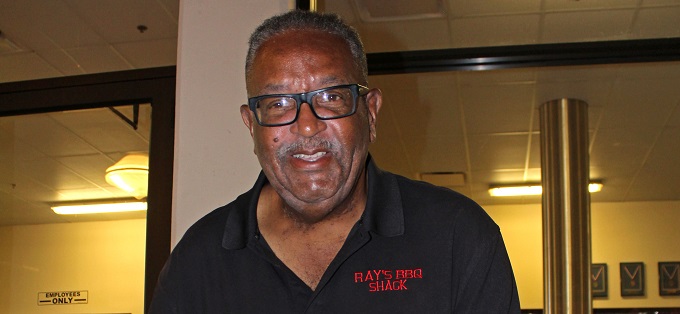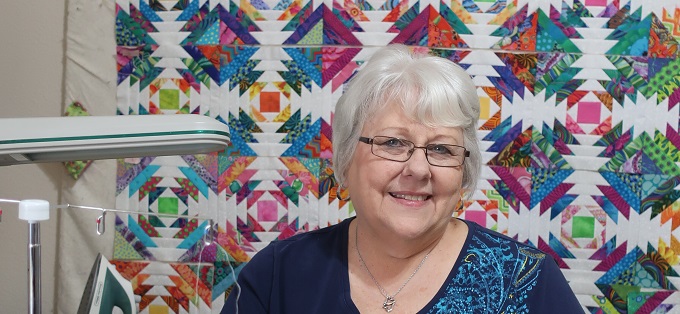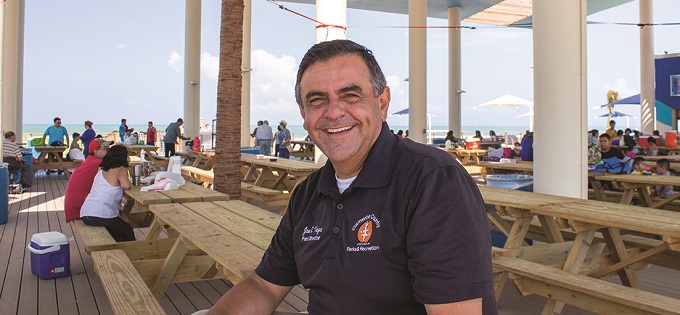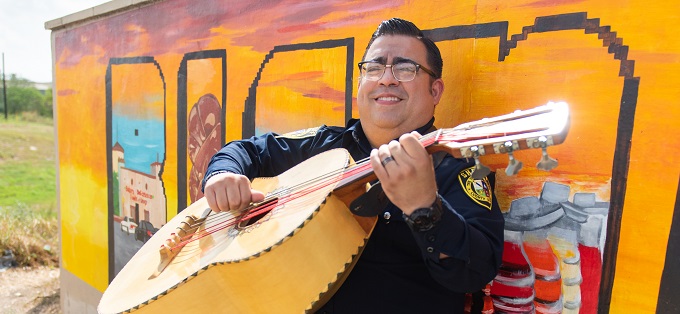Updating your browser will give you an optimal website experience. Learn more about our supported browsers.
Sheriff’s deputy is all about that bass
Born and raised in San Antonio, sheriff ’s deputy Brandon Rivas grew up immersed in San Antonio’s vibrant music scene. His love of music, his optimism and his community helped him endure a devastating diagnosis.
Story and photo by Rebecca L. Bennett
“It can be the worst day of your life, but it’s up to you, right?” says Bexar County Sheriff ’s Deputy Brandon Rivas, who was diagnosed with an extremely rare and aggressive form of cancer on May 5, 2017 — his 42nd birthday.
As devastating as that news was, Brandon’s characteristic optimism prevailed. “We left and bought a bunch of beer and a bunch of steaks,” he says. “I just thought, ‘Well, we can go home and be bummed about it, or we can celebrate now because I’m still here.’”
Born to bass
Born and raised in San Antonio, Texas, Brandon grew up immersed in San Antonio’s vibrant music scene. His grandfather, father and uncles all pursued careers as professional musicians beginning in the 1940’s and ‘50s, playing locally and even touring internationally in bands like Chicano soul group, the Royal Jesters.
Brandon learned to play the upright bass at age 12 after joining the strings program at Garner Middle School. He quickly grew to view the instrument as an integral part of his identity. “When it’s against me and I’m playing, I feel like it’s a part of me and an extension of myself,” he says. “I don’t even feel like it’s an instrument. It’s like me talking.”
After high school, Brandon accepted a classical music scholarship to play the upright bass at Loyola University. While living in New Orleans, whose music scene and diversity reminded him of San Antonio, he fell in love with jazz music and — much to his parents’ good-natured dismay — to gigging.
Brandon left his scholarship and spent more than a decade touring the world with various jazz groups as an electric bass player. He eventually made it all the way to Carnegie Hall with the Doc Watkins trio.
For him, there is nothing quite like the thrill of performing on stage. “Playing bass, there’s just a freedom of expression,” he says. “With jazz, I can express myself how I want through improvising to the music.”
A strong base
When Brandon and his wife of 14 years, Amy, had their first child, he knew he needed to find a way to continue playing music while helping Amy, a nurse practitioner, provide income and benefits for his family. “She said, ‘Find a job that will give you the same amount of excitement that you get on stage,’” Brandon says. “So I joined the Army band.”
Bootcamp presented unique challenges for the thirty-something free spirit. As the oldest in his platoon, he frequently found himself supporting the younger recruits in their training.
He naturally assumed a similar role when he was accepted into the Bexar County Sheriff’s Office’s (BCSO)academy at age 40. “Having life experience really got me through all that,” he says. “I’d have to gather my group together and be like, ‘Guys, this is hard on purpose. Just hang in there.’”
He had no idea then that his perpetual positivity would also help him survive the hardest fight of his life.
Brandon served his first year in uniform at the county jail, which is a standard requirement for all new deputies. That’s where he was working when he first began noticing warning signs that he may have an underlying medical problem, including severe itchiness and swelling in his lymph nodes.
Sure enough, after thorough testing, Brandon’s oncologist diagnosed him with Anaplastic large cell (ALK) non-Hodgkin lymphoma, a very rare (less than 2% of all lymphomas) and very serious form of lymphoma requiring immediate and aggressive treatment.
“I told my wife, ‘Thank God it’s me and not you or anyone else,’” he says. “When I make my mind up to do something, I’m going to do it… so if there’s anyone that can fight it, it’s me. The hardest part was telling everybody — telling my parents, telling my oldest kid.”
Brandon credits his Christian faith, his strong family ties, the companionship of his “cancer dog”, Chance, his “rockstar” medical team and the overwhelming support he received from local musicians, Bexar County, his brothers and sisters in law enforcement, and the larger San Antonio community, for helping him through treatment.
Specifically, Brandon endured six rounds of “standard” chemotherapy, which technically put him into remission by eliminating all signs of the disease. However, since his strain of cancer comes with a high chance of relapse, he also had to undergo a brutal final chemotherapy session of the highest dose that can be administered to cancer patients, followed by a life-saving bone marrow stem cell transplant.
Day in and day out, Brandon’s fellow musicians and deputies showed up for him and his family, buying them groceries, picking up the kids from school, and cleaning the house. VFW Post 76 even hosted a benefit concert and barbecue to support Brandon’s fight, and the event drew thousands.
“There was so much love and support just from everybody you can imagine,” he says. “It was amazing.”
Back to business
Brandon returned to light duty in May 2018, just one year after his diagnosis, and was soon offered a full-time role in BCSO’s Media Services department.
Now that his strength has returned, he has also resumed playing bass with the Doc Watkins trio, working with his father and uncles on their first album together, writing music for his own debut record, and preparing to lead BCSO’s new mariachi band.
“The most amazing thing was being able to play a whole gig again,” he says. “I was still bald from all of the chemo, but man, the music was calling me. I felt like I was back to being myself.”
Brandon also currently serves on BCSO’s peer assistance team, which provides deputies in need with peer support when life hits hard. He says serving in this capacity is the least he can do, since BCSO saved his job and provided benefits that helped ease the financial burden of his treatments, and since his fellow deputies were always quick to help him in any way he needed.
“BCSO saved my life twice, not only physically, but also mentally, because it’s a hard one with all the what ifs,” he says. “They’ve given me another shot at life, and so helping out other guys with cancer completes the circle for me.”
Related Content

01.06.2017
Cooking up a second career in retirement
Retired Harris County Deputy Sheriff Rayford Busch spent decades perfecting his barbecuing process. So when he retired, he was ready ...
Read more
01.05.2018
Quilting and community service
Retiree Dianne McCrary’s creations are beautiful as well as functional. Each quilt that she creates is a community service project to...
Read more
07.19.2019
A Better Day at the Beach
Joe Vega of Cameron County Parks and Recreation oversees the renovation and restoration of Isla Blanca Park. When complete, the islan...
Read more